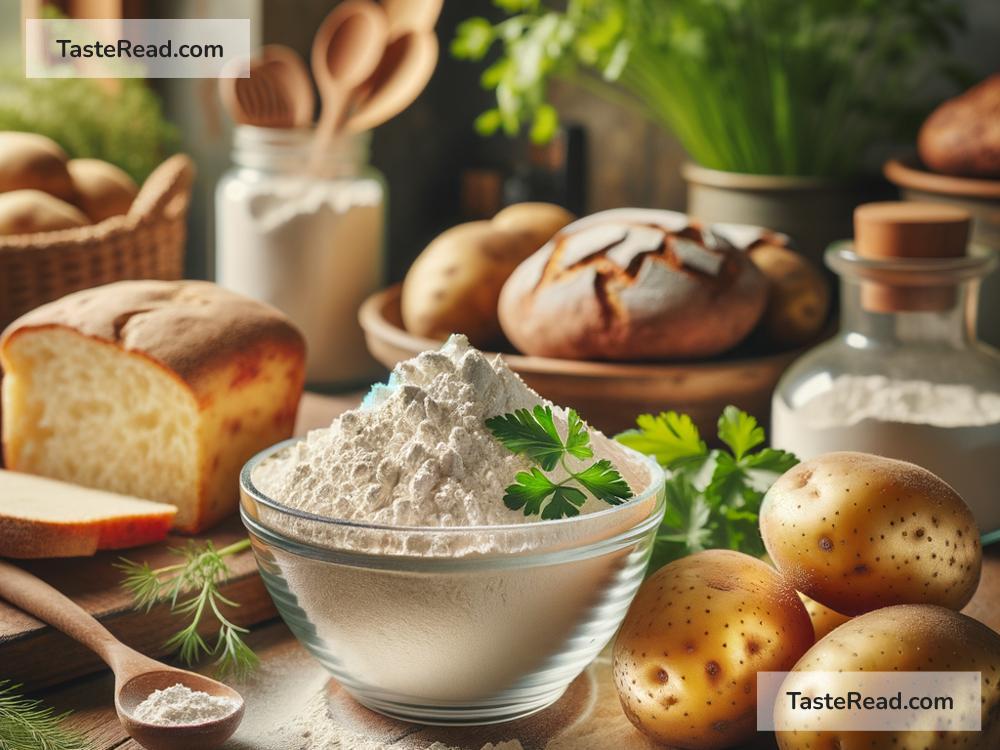Potato Flour: A Natural Gluten-Free Alternative for Gut Healing Diets
When it comes to keeping your stomach happy and healthy, the food you choose can make all the difference. For many people struggling with tummy troubles or living with conditions such as gluten intolerance or Celiac disease, finding the right ingredients is key to avoiding discomfort and promoting healing. One special ingredient gaining popularity among health-conscious cooks is potato flour—a natural, gluten-free option that’s both gentle on the gut and versatile in the kitchen. Let’s dive into what makes potato flour such a fantastic addition to gut-healing diets.
What Is Potato Flour?
Potato flour is made from whole potatoes that have been dried and ground into a fine powder. Unlike potato starch, which is extracted from the starchy portion of potatoes, potato flour retains all the nutrients and fiber found in the entire potato. This makes it an excellent choice for those looking for healthy, whole-food options in their diet.
The best part? Potato flour is naturally gluten-free. Gluten is a protein found in wheat, rye, and barley that can trigger digestive problems for people with sensitivities or autoimmune disorders like Celiac disease. By replacing wheat-based flours with potato flour, you can enjoy your favorite recipes without worrying about upsetting your gut.
Why Choose Potato Flour for Gut Healing?
If you’re following a gut-healing diet, potato flour has several benefits that make it a smart choice:
-
Easy to Digest
Some flours, especially those made from grains containing gluten, can be hard on your digestive system if you’re dealing with gut inflammation or sensitivity. Potato flour, on the other hand, is gentle and easy to digest. Because it’s made from simple, natural ingredients, it’s less likely to cause irritation. -
Rich in Fiber for Gut Health
Whole potato flour contains fiber, which supports digestion and helps feed the “friendly bacteria” in your gut. Fiber also keeps things moving smoothly in your digestive system, which is essential for overall gut health. -
Gluten-Free Alternative
People with gluten intolerance or Celiac disease can experience symptoms like bloating, diarrhea, and abdominal pain when they consume gluten. Potato flour is a safe alternative that allows you to enjoy baked goods and other recipes without worrying about these uncomfortable side effects. -
Packed with Nutrients
Potatoes are loaded with vitamins and minerals, including potassium, vitamin C, and B vitamins. When potatoes are turned into flour, many of these nutrients are retained. This makes potato flour a nutritious choice that can support your overall health while being kind to your gut.
How Can You Use Potato Flour?
One of the reasons potato flour is so popular is because it’s incredibly versatile. While the texture and flavor are slightly different from traditional wheat flour, it works wonderfully in many recipes, especially when combined with other gluten-free flours like rice flour, almond flour, or tapioca starch.
Here are a few ways you can use potato flour in your cooking:
-
Thickening Soups and Sauces: Potato flour works as a natural thickener for soups, stews, and gravies. It blends smoothly and adds a silky texture without altering the flavor of the dish.
-
Gluten-Free Baking: Potato flour helps give structure to gluten-free baked goods like bread, muffins, pancakes, and cookies. It’s often used in combination with other flours to balance the texture.
-
Making Crispy Coatings: You can use potato flour to coat vegetables or meat before frying or baking for a perfectly crisp finish.
-
Creating Soft and Moist Dough: In recipes like dumplings and tortillas, potato flour adds moisture and tenderness while keeping things gluten-free.
When using potato flour in baking, keep in mind that it absorbs more liquid than wheat flour. Adjust your recipe carefully and consider combining it with other gluten-free flours for the best texture.
Potato Flour vs. Other Gluten-Free Flours
If you’re exploring gluten-free options, you might already know about other popular choices like almond flour, coconut flour, and rice flour. Each type of flour has its unique qualities, but potato flour stands out for being mild, inexpensive, and easy to digest.
Unlike almond or coconut flour, potato flour doesn’t add a nutty or sweet flavor to recipes, making it a neutral option. It’s also easier to find in stores than some more exotic gluten-free flours. Another advantage is that it works universally in savory and sweet dishes and doesn’t require a complex blend to be effective.
Tips for Buying and Storing Potato Flour
When shopping for potato flour, be sure to choose brands labeled as “100% potato flour” to avoid any fillers or additives. Look for a fine, powder-like consistency. Many health food stores and online retailers offer high-quality potato flour.
Store it in an airtight container to keep it fresh. Potato flour can last for months when stored in a cool, dry place, making it a practical addition to your pantry.
Conclusion
If you’re on a gut-healing diet or looking for a gluten-free alternative, potato flour is worth considering. Its gentle nature, high fiber content, and nutritional benefits make it a standout choice for promoting healthy digestion while allowing you to enjoy a variety of delicious recipes. Whether you’re baking, thickening soups, or experimenting with new dishes, potato flour is a natural and affordable way to support your gut health.
So, next time you’re planning a meal, give potato flour a try—your gut will thank you!


